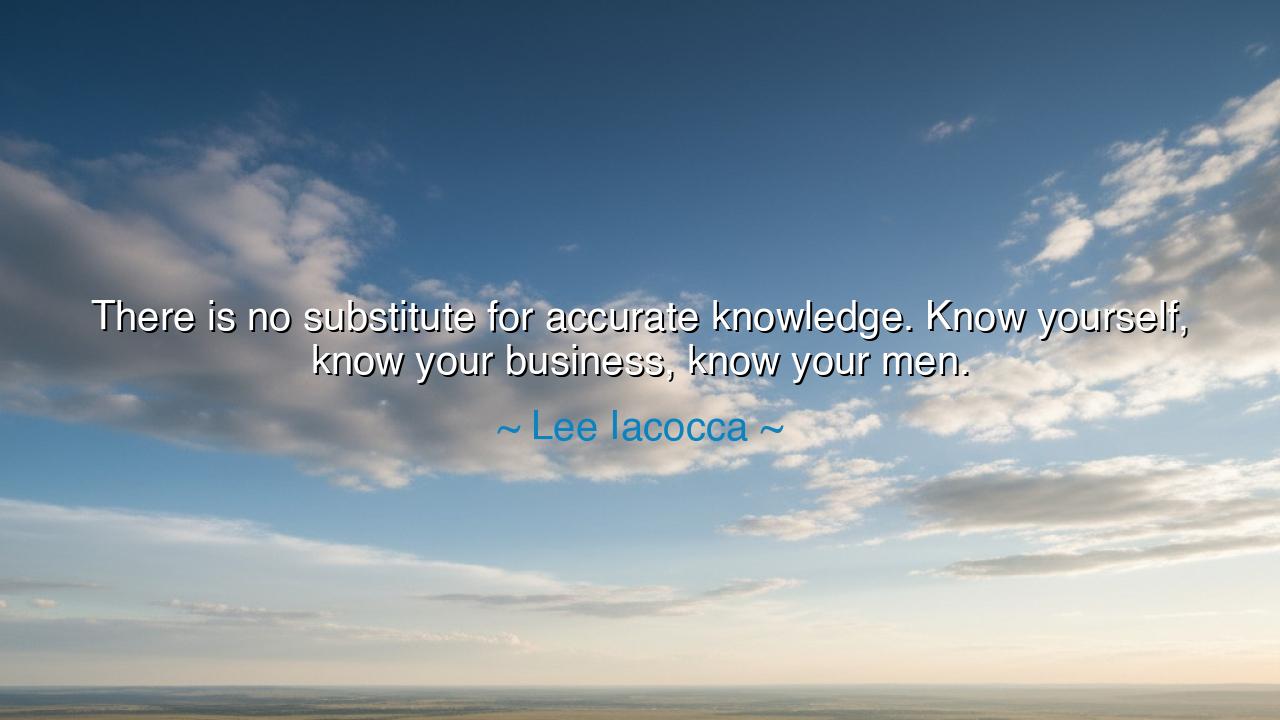
There is no substitute for accurate knowledge. Know yourself
There is no substitute for accurate knowledge. Know yourself, know your business, know your men.






The words of Lee Iacocca — “There is no substitute for accurate knowledge. Know yourself, know your business, know your men” — are as sharp and enduring as the steel of the automobiles he once built. They are not merely the counsel of a businessman, but the creed of a leader who understood that wisdom begins with truth. In these few words lies the foundation of all mastery — self-awareness, clarity of purpose, and understanding of those who follow you. Iacocca reminds us that success, whether in battle, in commerce, or in life, cannot be built upon illusion. It is forged in the fire of accurate knowledge, which pierces through pride, ignorance, and guesswork to see things as they truly are.
In the style of the ancients, one might say: he who rules without knowledge is like a captain steering through fog without stars. The ancients taught that knowledge is not mere information — it is insight joined with discipline. To “know yourself” is to master your own nature — your strengths, your weaknesses, your motives, your fears. It is the oldest of teachings, echoing the oracle of Delphi: “Know thyself.” For he who knows himself cannot be deceived by vanity, nor swayed by anger, nor blinded by ambition. Iacocca, in his modern way, revives that same wisdom: before one can lead others, one must first govern the kingdom within.
The origin of this quote lies in Iacocca’s life as a titan of American industry — a man who rose from an engineer at Ford to its president, only to be cast out and then rise again to save the Chrysler Corporation from collapse. When he spoke of “knowing your business,” it was not an abstraction but a principle proven in fire. During Chrysler’s darkest hour in the late 1970s, Iacocca confronted a company drowning in debt, inefficiency, and doubt. He did not guess or hope — he studied. He examined every line of the company’s operations, every bolt and every balance sheet. By knowing his business, he was able to act not from panic but from precision. He secured government loans, inspired his workers, and transformed Chrysler from ruin to revival. His triumph was not luck; it was the fruit of accurate knowledge applied with courage.
The second command — “know your men” — carries the wisdom of every great commander from antiquity to the present. Iacocca, like Alexander or Lincoln, knew that leadership is not domination but understanding. To lead others, one must see not just their abilities but their hearts. The leader who ignores his people’s spirit leads only bodies, not souls. When Iacocca took over Chrysler, he went among his workers. He spoke their language, listened to their grievances, and reminded them that they were not just laborers, but builders of something larger than themselves. In that moment, he became not merely a boss but a commander of purpose — for he knew his men, and they, in turn, trusted him.
The ancients would have called this harmony phronesis — practical wisdom. It is the art of seeing the truth clearly, in oneself and in others. Those who lack such knowledge stumble, no matter how talented or ambitious they are. History bears countless examples. Consider Napoleon, whose brilliance once illuminated Europe. In his rise, he knew his men — their hunger, their pride, their faith. But in his fall, blinded by arrogance, he lost touch with both himself and his soldiers. He no longer knew his limits, nor theirs. Thus, his empire collapsed, not from lack of power, but from the decay of accurate knowledge.
Iacocca’s words, though spoken for the boardroom, carry the same eternal warning: ignorance, whether of self or others, is the seed of ruin. The man who does not study his craft will fail in his craft. The leader who does not understand his followers will lose them. And the soul who does not look inward will drift through life as a stranger to itself. Accurate knowledge is not a tool; it is a way of life — a discipline of perception that must be renewed daily through humility and inquiry.
Let this be the teaching for all who walk the path of leadership and purpose: seek truth before triumph. Study your own heart, for it will deceive you if left unexamined. Learn your craft with reverence, not haste. Know those who walk beside you — their hopes, their fears, their strengths — for they are the hands through which your vision will take form. And remember always that ignorance, no matter how gilded, cannot sustain greatness. The house built on falsehood will fall; but the one built on knowledge will endure storms and time alike.
So carry Iacocca’s wisdom as a compass: Know yourself. Know your business. Know your men. For in knowing, you will act with clarity. In acting, you will lead with justice. And in leading, you will transform not only your work, but your world — as every great builder of civilizations has done, armed not with guesswork, but with truth.






AAdministratorAdministrator
Welcome, honored guests. Please leave a comment, we will respond soon